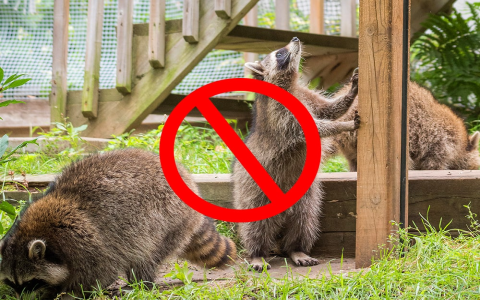How Can I Stop Raccoons from Pooping on My Deck?
Dealing with wildlife can be tricky, and raccoons, in particular, have a reputation for being mischievous and persistent. Finding raccoon droppings on your deck not only presents a sanitation issue but can also create an unpleasant environment for outdoor activities. Here’s a comprehensive guide to help you deter these clever creatures from ruining your outdoor space.

One of the first steps in addressing this issue involves understanding why raccoons are attracted to your deck in the first place. Raccoons are typically drawn to areas where food is available or where they can find shelter. If you have outdoor furniture, pet food, or garbage bins nearby, these can serve as invitations for raccoons to visit. Start by removing potential food sources. Ensure that all trash cans have secure lids, and avoid leaving pet food outside overnight. Clean up spills and crumbs promptly, as even small traces of food can attract these animals.
Another key strategy involves making your deck less appealing as a resting spot. Raccoons prefer to feel safe and sheltered; if your deck seems cozy, they may use it as their bathroom. Consider using motion-activated lights or sprinklers. Raccoons are nocturnal and tend to shy away from unfamiliar or sudden movements. When they approach in the dark, a sudden splash of water or bright lights will often scare them away, making them think twice about coming back.
In addition to lighting and water deterrents, you can also add physical barriers. Installing a solid gate or fence around your deck can help keep raccoons at bay, especially if the fence extends underground. Raccoons are adept climbers and diggers; thus, a tall fence with an extending base can work wonders. Furthermore, consider placing sharp or prickly materials on areas of your deck where raccoons may try to land or walk. Items like chicken wire or strategically placed thorny plants can create an unwelcoming environment.
It’s also worthwhile to embrace natural repellents. Scents that raccoons find unpleasant can be a helpful deterrent. Products containing vinegar, citrus, or even certain essential oils, like peppermint, can signal to raccoons that your deck is not a desirable location. Spraying these scents around the perimeter of your deck or on furniture can reduce the likelihood of visits. Additionally, commercial raccoon repellents are available in stores, which utilize smells that deter these animals without causing them harm.
While taking preventative measures can significantly reduce encounters with raccoons, some situations might require a more aggressive approach. If you notice a persistent raccoon problem, live traps can be a useful solution. Make sure to check local regulations before trapping raccoons, as some areas have laws that require humane handling. If you opt for trapping, be prepared to transport the raccoon far from your property to discourage its return.
Lastly, consider the role of community awareness. If you live in a neighborhood where raccoons are frequently seen, speak with your neighbors about wildlife management strategies. Pooling resources and sharing experiences can lead to more effective deterrence methods. A coordinated effort can significantly impact reducing the raccoon population in your area, as well as your individual encounters.
Taking steps to prevent raccoons from pooping on your deck requires a multifaceted approach. By eliminating food sources, using deterrents, both natural and mechanical, and potentially enlisting professional help, you can reclaim your outdoor space. Not only will a clean deck enhance your enjoyment of your home, but it will also contribute to the overall health and hygiene of your environment. With these techniques, your deck can become a raccoon-free sanctuary, where you can relax and enjoy the outdoors without worry.



